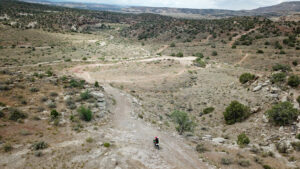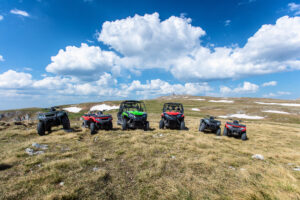Colorado is known for its rugged beauty and adventurous spirit, two things that make it the perfect place to own and ride a utility terrain vehicle (UTV). But when it comes to taking that UTV from the trail to the street, there are some important rules and requirements to know. Whether you’re hoping to explore backroads near your favorite trailhead or simply want to ride through town, understanding the ins and outs of street-legal UTVs in Colorado is essential.
Are UTVs Street-Legal in Colorado?
The short answer: not by default. Under Colorado law, UTVs (along with other off-highway vehicles, or OHVs) are not considered street-legal and cannot be operated on most public roads, highways, or streets.
However, there are exceptions. Many towns, counties, and other local jurisdictions have enacted ordinances that allow UTVs on certain public roads. This means that in some areas, a street-legal UTV in Colorado can be driven legally, but only where local laws allow it.
So, while the state itself does not issue full street-legal status to UTVs through the DMV, some local governments permit limited road use. Always check with the specific county or town before heading out.
What Makes a UTV Street-Legal in Colorado?
To make your UTV street-legal for permitted roads in Colorado, it must meet specific requirements. You’ll need to ensure your vehicle complies with Colorado OHV laws and any additional rules set by your local jurisdiction.
One of the key differences to understand is that having your UTV registered in another state as a street-legal vehicle does not automatically make it legal to operate on all Colorado roads. Colorado’s 2021 House Bill 21-1138 clarified that registration in another state doesn’t override Colorado’s more restrictive laws. However, you can still drive your out-of-state registered UTV on approved local roads.
Street-Legal UTV Requirements: Mirrors, Horns, Plates & More
Meeting UTV street-legal requirements in Colorado means more than just slapping on a license plate. While requirements can vary by jurisdiction, these are some of the common features your UTV will likely need to operate on approved roads:
-
- One or more mirrors (at least one must provide a clear view behind the vehicle)
-
- Functioning horn
-
- Turn signals (front and rear)
-
- Brake lights and tail lights
-
- Headlights with high and low beams
-
- A properly displayed license plate or OHV permit decal
-
- Muffler and spark arrester (meeting sound regulations)
-
- Tires approved for highway use
-
- Seat belts for all passengers
Local ordinances may have additional requirements, so double-check with your town or county before modifying your vehicle.
How to Register a Street-Legal UTV in Colorado
While you cannot register a UTV as a passenger vehicle through the Colorado DMV, you can register it as an OHV through Colorado Parks and Wildlife (CPW). This process is essential for residents and required for operating your UTV on public lands, designated trails, and approved roads.
For first-time UTV registration in Colorado, you can register:
-
- By mail: Send a completed registration form, proof of ownership, and payment to the CPW Registration Unit in Littleton.
-
- In person: Visit any CPW location or authorized Registration and Permit Vendor with your completed form and documents.
Your decals and registration card will arrive by mail in 10-20 business days. Keep your confirmation receipt with you until the official documents arrive.
Correct placement of your registration decals is also very important. For side-by-sides and UTVs, place one decal on each of the outer faces of the roll bars, where they are clearly visible.
Where Can You Drive a Street-Legal UTV in Colorado?
Even with all the proper equipment and a current registration, you still need to stick to approved roads. According to Colorado UTV laws, you can legally operate a UTV only on roads designated by local jurisdictions for OHV use. That includes some city streets, county roads, and backroads in OHV-friendly regions.
You can also drive a UTV across public roads at 90-degree angles to reach a trail or staging area, as long as you yield to traffic and cross safely.
Designated OHV roads in public lands, like National Forests or State Parks, are also open to UTVs in many areas. Check with the land management agency or consult Stay the Trail Colorado for maps and approved routes.
Using your UTV on unapproved public roads is still illegal, regardless of where your UTV is registered. Violations can result in fines and citations, so always plan your route carefully.
Do You Need Insurance for a UTV on Public Roads?
If you plan to drive your UTV on any public road in Colorado, having liability insurance is a smart move – and in some areas, it may be required. While Colorado law does not mandate insurance for OHVs on trails or off-road areas, many counties that allow on-road use require proof of insurance.
In general, it’s a good idea to carry coverage that includes:
-
- Liability (for injuries or damage to others)
-
- Comprehensive (for damage to your UTV from events like theft, fire, or falling trees)
-
- Collision (for accidents on or off the road)
Speak with your insurance provider about the best policy for your vehicle based on how and where you plan to ride.
Top Street-Legal UTVs for Colorado Riders
While many UTVs can be modified to meet local on-road rules, some models are better suited for street conversion than others. The best UTVs for Colorado riders looking to go street-legal typically offer solid stock features, good visibility, and strong performance.
Here are a few top picks available at Fay Myers Motorcycle World:
-
- Polaris RZR: High-performance side-by-side with responsive handling and plenty of accessory options
-
- Can-Am Maverick: Built for speed and rugged terrain, with options for lights and mirrors pre-installed
-
- Honda Pioneer: Known for reliability and comfortable seating, with multiple seating configurations
-
- Kawasaki Teryx: Great for both work and play, with solid frame design and off-road capability
Each model can be customized to meet UTV street-legal requirements in Colorado.
Avoiding Fines: Common Mistakes When Converting a UTV for the Street
Even the most seasoned off-roader can overlook a requirement or make a mistake when trying to go street-legal. Here are a few common pitfalls to watch for:
-
- Assuming registration in another state makes your UTV legal in Colorado
-
- Riding on unapproved roads without checking local ordinances
-
- Skipping essential safety equipment like mirrors or working brake lights
-
- Failing to display your Colorado OHV permit properly
-
- Forgetting to renew your UTV registration in Colorado on time
Avoid these issues by staying up-to-date with local laws, keeping documents on hand, and checking with authorities before your ride.
Visit Fay Myers and Check Out Our Selection of UTVs
If you’re ready to start your street-legal UTV Colorado journey, Fay Myers Motorcycle World is here to help. We offer a wide selection of top-rated UTVs from brands like Polaris, Can-Am, Honda, and Kawasaki, all ready to be customized for your next adventure.
Our team can walk you through the details of UTV registration in Colorado, help you understand local rules, and get your vehicle equipped with everything needed to meet street legal standards. We also carry all the accessories you need to meet safety and compliance requirements, from turn signal kits to street-approved tires.
Whether you’re exploring trails, cruising approved roads, or just looking for the best ride in town, Fay Myers has what you need. Stop by our Greenwood Village showroom or browse online to get started on your next road-ready adventure.
Photot crediit: PPstock




